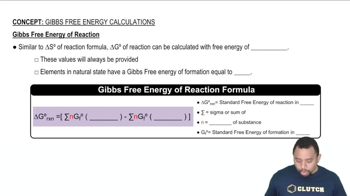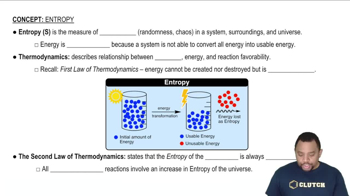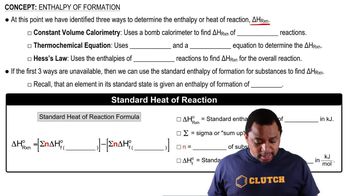Given the values of ΔH°rxn, ΔS°rxn, and T, determine ΔSuniv and predict whether or not each reaction is spontaneous. (Assume that all reactants and products are in their standard states.) a. ΔH°rxn = +135 kJ; ΔS°rxn = -282 J/K; T = 298 K

Given the values of ΔH°rxn, ΔS°rxn, and T, determine ΔSuniv and predict whether or not each reaction is spontaneous. (Assume that all reactants and products are in their standard states.) c. ΔH°rxn = +75 kJ; ΔS°rxn = -127 J/K; T = 298 K
 Verified step by step guidance
Verified step by step guidance
Verified video answer for a similar problem:
Key Concepts
Gibbs Free Energy

Entropy (ΔS)

Enthalpy (ΔH)

Given the values of ΔH°rxn, ΔS°rxn, and T, determine ΔSuniv and predict whether or not each reaction is spontaneous. (Assume that all reactants and products are in their standard states.) c. ΔH°rxn = -135 kJ; ΔS°rxn = -282 J>K; T = 298 K
Given the values of ΔH°rxn, ΔS°rxn, and T, determine ΔSuniv and predict whether or not each reaction is spontaneous. (Assume that all reactants and products are in their standard states.) a. ΔH°rxn = -75 kJ; ΔS°rxn = -127 J/K; T = 298 K
Calculate the change in Gibbs free energy for each of the sets of ΔH°rxn, ΔS°rxn, and T given in Problem 44. Predict whether or not each reaction is spontaneous at the temperature indicated. (Assume that all reactants and products are in their standard states.)
Calculate the free energy change for this reaction at 25 °C. Is the reaction spontaneous? (Assume that all reactants and products are in their standard states.) 2 Ca(s) + O2( g) → 2 CaO(s) ΔH°rxn = -1269.8 kJ; ΔS°rxn = -364.6 J/K
Fill in the blanks in the table. Both ΔH and ΔS refer to the system.
